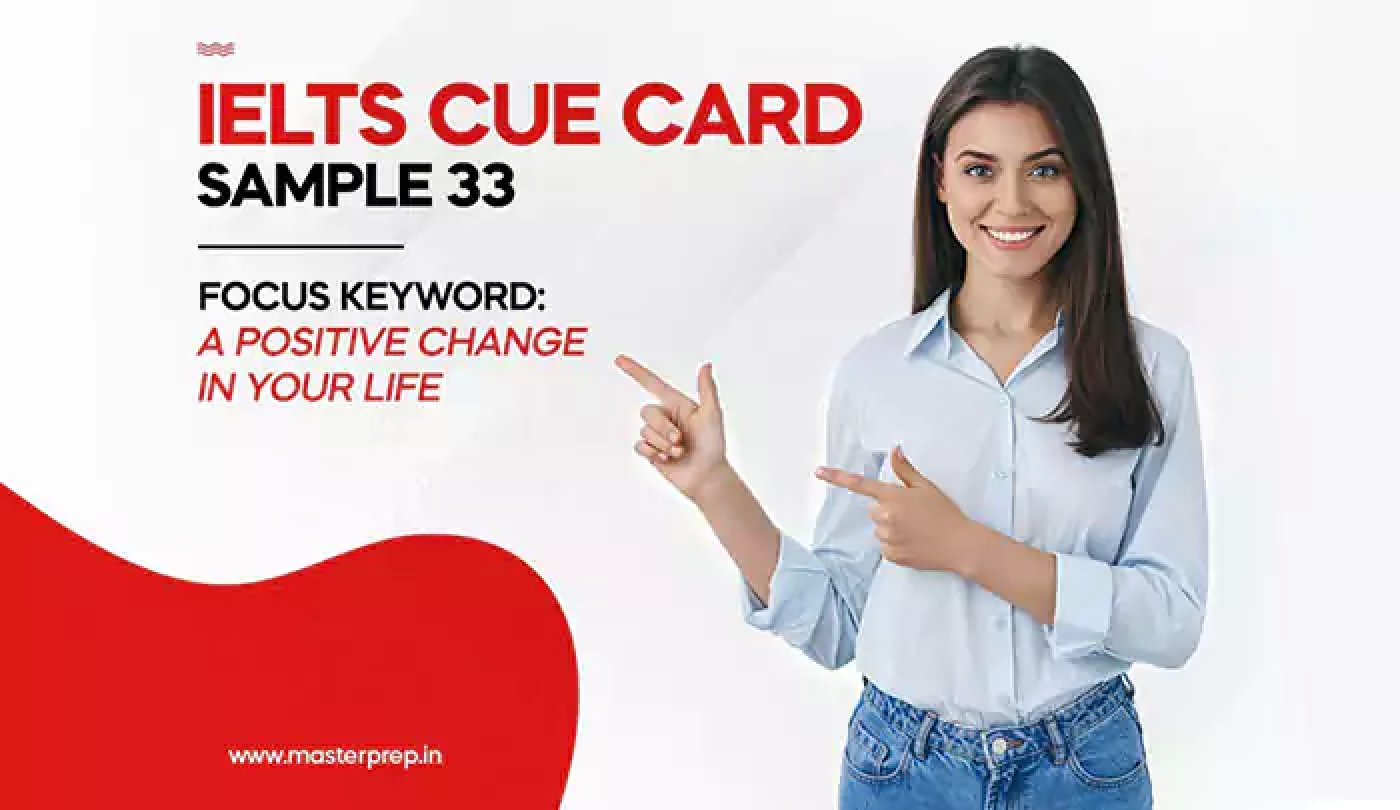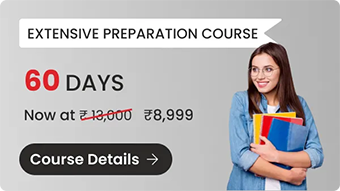• IELTS
IELTS Cue Card Sample 33 (A Positive Change in your Life)
8362 Reads
3 min Read
This blog contains information on approaching the cue card topic, which is very important in IELTS speaking. Key ideas have been illustrated along with the topic below, and they are also supported by the follow-up questions, which are very significant in the Speaking module. Furthermore, three model answers are provided in detail below for students to help them comprehend the cue card quickly and recall multiple ideas related to this blog's cue card topic. Finally, specific essential tips for attempting the respective cue card are also provided for the reader's benefit.

IELTS Speaking Part 2 topics can be complex because ideas emerge after the examiner's solo speaking session on a cue card topic. Students must maintain cohesion and speak without fumbling or breaking up, contributing to a good band score.
Cue card topics are typically drawn from general societal interests, such as hobbies and day-to-day activities. Understanding IELTS Speaking Part 2 is essential, as is having the right strategy. Predicting what questions you'll be asked is impossible, and the possibilities are endless.
Describe a positive change that has occurred in your life
What you should say is:
- the nature of the change
- when it occurred
- the specifics of the change
- how it influenced your life later on
Consider the following:
- What life changes do you want to make?
- Do you believe we have control over our destiny? How?
- What three most significant changes would you like to see in your country?
Also read : IELTS Exam fee
What is a CUE card?
When you take the IELTS exam’s speaking test, you are allotted a time of 1 minute to prepare for a specific topic, and that particular topic is termed as a CUE card. You can also call it a Candidate task card or task card.
Types of CUE cards in IELTS?
Generally, there are 9 types of CUE cards available for the speaking test of an IELTS exam. We have mentioned each & every CUE card type below:
1.CUE cards asking the candidate to describe a past event
2.CUE cards asking the candidate to describe a person
3.CUE cards asking the candidate to describe a habit
4.CUE cards asking the candidate to describe an object
5.CUE cards asking the candidate to describe a place
6.CUE cards asking the candidate to describe a hypothetical desire
7.CUE cards asking the candidate to describe a favourite thing
8.CUE cards asking the candidate to describe a cultural event & Item
9.CUE cards asking the candidate to describe anything crazy
CUE card Tips
Listed below are some of the most useful tips that help students efficiently attempt a CUE card in an IELTS exam.
- Speak for 3 to 4 minutes straight about anything.
- Start recording your talk
- You can stand in front of a mirror and talk to practice
- Add a few idioms, vocabulary, and informal expressions to make it interesting
- Prepare through the CUE cards & recent speaking tests.
- Use vocabulary according to the topic
Model Answer 1:
Without a doubt, we all go through some kind of change in our lives at some point in our lives. While some of these changes may go unnoticed, others can have a positive impact on our lives, and today I'd like to discuss one such positive change.
I had developed many hobbies in my life, but "reading" was just not one of them. Of course, I had no problems I had no problem studying academic books in order to pass tests in schools and colleges, but when it came to studying anything else, such as storybooks, novels, or books on science, technology, and improving life skills and knowledge, I became one of the laziest people on the planet.
My parents would even "bribe" me to develop a reading habit, but nothing could really change my mind. But, one day, when I was a final-year university student about six years ago, one of my favourite teachers asked me to recommend some interesting books to read while he was away on vacation; I had no idea what to say.
My teacher smiled away, understanding my awkward situation, while I felt extremely 'embarrassed.' Following that incident, I decided to purchase some books and begin reading them one page at a time. I gradually became "addicted" to reading certain types of books after that.
I even had trouble paying for the books I was buying at one point because there were so many of them! Anyway, I'm glad I started reading books because it gave me a confidence boost by teaching me a lot of unknown and amazing things about the world.
Furthermore, after developing my reading habit, I gained a great understanding and appreciation for various types of people from various cultures, lifestyles, and backgrounds. Finally, this particular change aided me in my later career development by encouraging me to read numerous books on "career and skill" development.
Also read: IELTS Registration
The positive change I'd like to highlight is that I've started playing outdoor games instead of computer games. I began learning many things after receiving my first personal computer when I was about nine years old.
Aside from that, I began playing computer games. Because computer games are addictive, I found myself playing them whenever I had free time. This addiction prevented me from participating in outdoor sports such as cricket and football.
I became very interested in computer games and preferred to play them at home rather than go to open spaces or fields to participate in outdoor games that require physical exercise. Not that computer games are all bad, but playing them all the time is not a good thing, especially for children.
I discovered that I was spending more time inside than outside. When my parents noticed this, they talked to me about it and explained the importance of outdoor activities to me. They told me that I could only play computer games for an hour a day and that I had to go outside to play with my friends in the evenings.
This was obviously a significant improvement for me. I'm not opposed to computer games, but I believe that if there are more important things to do, we should not spend all of our time playing computer games.
This change had a very positive impact on me. I became a good cricket player, and later on, I began managing my time more prudently, and I am confident that this change has benefited both my physical and mental health.
Also read: IELTS Exam pattern
Model Answer 3 :
Change is an unavoidable part of life. Change, hopes, and challenges make our lives exciting and worthwhile. Some changes are unexpected, while others have been long anticipated and are meant to benefit us.
Changes frequently define who we are and place us in situations that we find either challenging or advantageous. This cue card topic reminds me of a significant time in my life when a change brought about a positive change in my life.
When I was 14 years old, my family moved from our hometown to the capital city of our country. This was a significant change for my family, and especially for me. I had to leave my school, friends, relatives, and familiar places behind and begin living in a place where I had no friends, no one to visit, and no known place to play or go on outings.
This was initially a very frustrating experience for me. My life became even more difficult after my father got me admitted to a school there. This, however, did not last long. My new high school was amazing, and it is still one of the best in the country. I quickly made new friends, and my teachers were extremely helpful. My parents used to take me outside every weekend, and I made a few friends at school and playmates in my neighbourhood.
My transitional period was over, and I began to feel completely at ease again. Nonetheless, my performance in my new school was unimpressive, and my parents were concerned. Being from a small town, it was not difficult for me to become the class's top scorer.
However, this was not the case at my new school. While I was the top scorer in my previous school, I couldn't even make the top ten in my new school. After the first term exam result, I began studying more diligently, visiting the library more frequently, and reading a reference book more than ever before.
I even reduced my time spent playing computer games in favour of outdoor activities such as football. Finally, all of those changes and activities enabled me to study more, learn more, and stay healthy.
I discovered that some of my previous health issues are no longer bothering me. This motivated me to study even harder and devote as much time as possible to regaining my former top-scorer image in the eyes of my parents.
My parents took me to places where I saw many new things for the first time in my life, and those experiences enriched my way of thinking and caused a silent transformation within me. The school library had a large book collection, and I read many of the books on my "to-read" list there. I came in third place on the final exam and gradually improved my performance.
Why was this change significant, and how has it impacted my life since? So, I guess I gave you the impression that when I moved to this city, I had to figure out how to adapt to changing circumstances and take on new challenges.
The outcome was very positive, and it taught me to take risks in my life. Nowadays, whenever I face a new challenge, I remember those times and brace myself for the inevitable. Furthermore, this change made me stronger. Even leaving my school, friends, and playmates was heartbreaking.
But, in the end, I dealt with it and learned that we must continue to seize opportunities, face challenges, and bring out the best in ourselves in order to keep up with the rhythm of life. Aside from that, because I was in a new school with more competition, I studied harder and learned even more.
My young and inquisitive mind learned so much in a large city that it would have been impossible to learn without moving to this city. At this point in my life, I still think about this change and find it fascinating and inspiring, particularly the way I handled it. It was a significant change that resulted in positive outcomes in my life.
Also read : IELTS Syllabus
Part 3: Discussion of Specifics:
Q. Do you believe that changes are always beneficial? [How come/why not?]
Answer: Changes are sometimes necessary for our lives, but they are not always beneficial unless we are selective in our choices. After all, some changes can be extremely stressful, time-consuming, costly, and even destructive, especially if they are not managed wisely in the long run.
Furthermore, sometimes a change, whether small or large, affects not only our own lives but also the lives of those around us - people who are not always open to such changes.
Q. Do you believe that as we get older, we become more optimistic about life and adapt to our surroundings? [How come/why not?]
Answer: No, I don't believe age has much to do with being more positive in life, nor does it affect our ability to change with our surroundings in a meaningful way. After all, age frequently has very little, if any, bearing on how a person actually thinks or behaves.
And what we used to enjoy at the age of 25 is still something we enjoy even when we reach the age of 50. Furthermore, if our life is full of negative and unhappy experiences - experiences with which we grow up - chances are we won't have much room for positivity in life.
Q. Explain typical changes that people typically experience in their lives?
Answer: I believe that every change in our lives, no matter how small or large, is significant because it affects us in some way. Having said that, we tend to regard some changes as more "significant" than others simply because they are more visible and pronounced in our lives.
Significant changes can range from getting married and having a baby to changing jobs and moving to a newly purchased home. Some argue that quitting a bad habit, such as smoking, is an example of a significant change.
Q. Is it necessary for people to make changes based on their surroundings? [How come/why not?]
Answer: Yes, it is critical to make changes in our lives based on our surroundings for a variety of reasons. The first is that it allows us to discover aspects of ourselves that would otherwise be hidden.
Second, it allows us to learn and adapt to different cultures, customs, behaviour, and belief systems, which would otherwise keep us on a collision course with the people around us. Furthermore, things do not always go as planned in life, and if that is the case, we have no choice but to change our plans if we truly want to be successful.
Q. How have young people's life expectations changed over the last decade? Is this a positive or negative statement? [Why?]
Answer: We can't deny that young people today want a lot more out of life than they did a decade or so ago. For example, because of some revolutionary technological changes, they want everything to be quick. Today, they also want to produce and consume more.
Furthermore, they are now more vocal than ever before in their efforts to make the world a more secure place for all by raising concerns about issues such as climate change. These changes, in my opinion, are more positive than negative because they are more eager to become the driving force of society's future development.
Q. How has your country's population changed in the last 20 years?
Answer: People in my country have changed dramatically in the last 20 years. These changes can be seen in their attitudes and behaviours. For example, they are more prosperous today and willing to spend more money to enjoy life.
They still value family life today, but they don't want to hold on to the traditional beliefs that they treasured just two decades ago. Furthermore, they are more interested than ever before in learning about other countries and cultures, which is unquestionably a good thing.
Also read : What is IELTS?
Tips for responding to this cue card topic:
Discuss a change that has resulted in something positive for you. You would need to describe how this change has positively impacted your life, so discuss something that has later proven to be very beneficial to you. You can discuss a decision or action you took that was later proven to be beneficial. You can also mention a bad habit you broke, a decision you made, or advice you received that resulted in positive changes in your life. This would differ from person to person, and the following are some ideas to discuss for this cue card topic:
- You quit/abandoned a bad habit, such as smoking.
- You started exercising, which has improved your health.
- You have chosen to study something other than what your parents wanted you to study.
- You completed a training or diploma course that assisted you in obtaining a good job.
- You've become more social, and as a result, you've made some good friends.
- You let go of your grudge or ego against a relative or friend, and you now have good relations with them.
- You worked part-time, and it aided you.
- You began spending more time outside rather than at home.
- You began learning a language, which has aided you.
- You began exercising, which has improved your health.
- You have chosen to study a subject other than what your parents wanted you to study.
- You began exploring some skills within yourself and have thus focused on those skill sets
- An experience or conversation has shifted your viewpoint on an issue.
- You have relocated from the countryside to the city.
- You began helping people after realizing it as a result of an incident in your life.
- You began assisting your family members with their tasks.
- You became more committed to a cause.
- You began participating in extracurricular activities such as debating, reading, blogging, cycling, swimming, and so on.
Also read : IELTS Eligibility
FAQ
You need to keep the points listed below in mind while answering a CUE card in the IELTS speaking test.
- Speak for 3 to 4 minutes straight about anything.
- Record your talk to assess your speaking abilities
- See in the mirror & speak to practice
- Add idioms, informal expressions and vocabulary when you speak
- Prepare through the recent speaking tests.
- Use vocabulary according to the topic
Candidates are not permitted to change their CUE card questions, and they have to prepare for all of them.
You receive a Task Card, also known as a Cue Card, from the examiner along with a few writing papers and a pencil during the IELTS speaking test. A CUE card consists of three dot points, a prompt, and an additional sentence.
Get great articles direct to your inbox
The latest news, articles, and resources, sent straight to your inbox every month.
Popular Universities to Study Abroad
World class education waiting for you.

University of Wisconsin-La Crosse
Wisconsin, USA • 142 Programmes
Tuition Fee : USD 19000-20000 / year


The Catholic University of America
District of Columbia, USA • 162 Programmes
Tuition Fee : USD 54000-55000 / year
.png)
Shorelight Group- Bellarmine University
Kentucky, USA • 41 Programmes
Tuition Fee : USD 48500-49000 / year

Fleming College - Haliburton Campus
Ontario, Canada • 1 Programmes
Tuition Fee : CAD 20000-20500 / year



Trebas Institute - Montreal Campus
Quebec, Canada • 6 Programmes
Tuition Fee : CAD 14000-16000 / year
Popular English Language Proficiency Exams
IELTS Online
- Live Classes
Blogs and Articles
Curated content to keep you updated on the latest education trends, news and more.
Updated on • Jul 17,2025 05:33 PM IST • USA
PTE Accepted Universities in Australia
Updated on • Jul 17,2025 05:09 PM IST • PTE
Part-Time Jobs for International Students in Australia
Updated on • Jul 17,2025 03:44 PM IST • Australia
Updated on • Jul 12,2025 04:02 PM IST • USA
Updated on • Jul 11,2025 11:32 AM IST • Education
CPT vs OPT: Meaning, Difference, and How to Apply
Updated on • Jul 11,2025 10:40 AM IST • USA
Masters in Computer Science in UK: Top Colleges, Eligibility, Scholarships
Updated on • Jul 10,2025 11:29 AM IST • study in the UK
Highest Paying Jobs in the World
Updated on • Jul 08,2025 01:40 PM IST • Study Abroad
MBA in Australia for Indian Students: Best Universities, Requirements, Scholarship, Courses, Jobs
Updated on • Jul 08,2025 01:35 PM IST • Australia
Canada vs Australia: Which Country is Better for Indian Students in 2025?
Updated on • Jul 07,2025 12:46 PM IST • Education
France vs Germany: Which Is Better for International Students?
Updated on • Jun 30,2025 05:15 PM IST • Education
Top 10 Agricultural Universities in USA
Updated on • Jun 27,2025 05:25 PM IST • USA
Most In-Demand Future Careers in 2025
Updated on • Jun 26,2025 04:41 PM IST • Education
How Much Do Nurses Make in the U.S.?
Updated on • Jun 23,2025 03:59 PM IST • USA
Updated on • Jun 21,2025 02:00 PM IST • USA
MBA in UK: Universities, Eligibility, Types, and Career Opportunities
Updated on • Jun 19,2025 04:09 PM IST • UK • study in the UK
Scholarships in France for Indian Students
Updated on • May 29,2025 05:22 PM IST • France
Intakes in Dubai for Indian Students
Updated on • May 27,2025 03:34 PM IST • Study in Dubai
France Student Visa 2025 – Requirements, Fees, Checklist & Application Process
Updated on • May 23,2025 03:36 PM IST • France
MBA in France for Indian Students in 2025
Updated on • May 22,2025 05:35 PM IST • France
Related Blogs and Articles
A little effort to provide an authentic and reliable content for keen readers!!
Updated on • 11-04-2025 • IELTS
Describe Your Hometown IELTS Speaking Part 1 Topic
Updated on • 07-04-2025 • IELTS
PTE vs IELTS : Know the Difference and Which is Easier?
Updated on • 21-03-2025 • IELTS
IELTS Exam Dates 2025 in India
Updated on • 18-01-2025 • IELTS
IELTS Reading Practice Tests 2025: Reading Passage and Sample Questions
Updated on • 15-01-2025 • IELTS
IELTS Letter Writing Topics 2025
Updated on • 15-01-2025 • IELTS
Canada IELTS band requirements 2025
Updated on • 10-01-2025 • IELTS
Updated on • 25-11-2024 • IELTS
Updated on • 21-11-2024 • IELTS
Updated on • 02-11-2024 • IELTS
Linking Words for IELTS Speaking - Word List & Tips
Updated on • 25-10-2024 • IELTS
IELTS Writing Task 2 - Academic and General Topics with Sample Answer
Updated on • 25-10-2024 • IELTS
IELTS Writing Task 2: Tips, Lessons & Models
Updated on • 25-10-2024 • IELTS
IELTS Test Report Form (TRF): Number, Tracking, Validity and Sample
Updated on • 25-10-2024 • IELTS
IELTS Speaking Samples and Answers
Updated on • 25-10-2024 • IELTS
Updated on • 25-10-2024 • IELTS
Updated on • 25-10-2024 • IELTS
IELTS Sample Charts for Writing Task 1 Practice
Updated on • 25-10-2024 • IELTS
IELTS GT Writing Task 1/ IELTS Letter Writing
Updated on • 25-10-2024 • IELTS
Updated on • 25-10-2024 • IELTS















